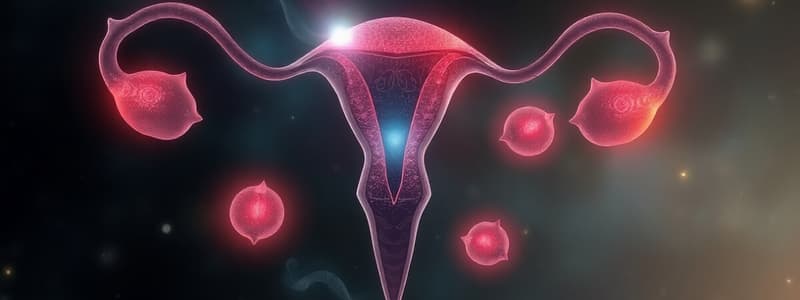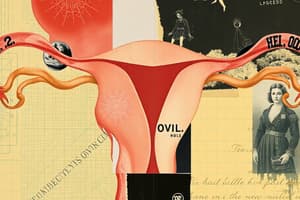Podcast
Questions and Answers
What is the process of egg cell production called?
What is the process of egg cell production called?
- Fertilization
- Oogenesis (correct)
- Menstruation
- Spermatogenesis
All primordial follicles develop into mature follicles by the time of ovulation.
All primordial follicles develop into mature follicles by the time of ovulation.
False (B)
What are the three parts of the uterine tubes?
What are the three parts of the uterine tubes?
Infundibulum, isthmus, ampulla
During ovulation, the ______ releases its secondary oocyte.
During ovulation, the ______ releases its secondary oocyte.
Match the following structures with their functions:
Match the following structures with their functions:
Where does fertilization of the egg typically occur?
Where does fertilization of the egg typically occur?
The uterus has a thin, non-muscular wall.
The uterus has a thin, non-muscular wall.
What happens to the non-dominant follicles before ovulation?
What happens to the non-dominant follicles before ovulation?
What is the primary function of the vagina?
What is the primary function of the vagina?
The cervix is located at the upper part of the uterus.
The cervix is located at the upper part of the uterus.
During which process is the inner lining of the uterus shed?
During which process is the inner lining of the uterus shed?
The fertilized egg embeds itself in the __________ during pregnancy.
The fertilized egg embeds itself in the __________ during pregnancy.
Which organ connects the ovaries to the upper part of the uterus?
Which organ connects the ovaries to the upper part of the uterus?
The vagina is located in front of the bladder.
The vagina is located in front of the bladder.
What happens to the uterus during pregnancy?
What happens to the uterus during pregnancy?
Match the following reproductive organs with their functions:
Match the following reproductive organs with their functions:
Which hormone is primarily responsible for the development of female secondary sexual characteristics?
Which hormone is primarily responsible for the development of female secondary sexual characteristics?
The male reproductive system is responsible for producing and delivering sperm.
The male reproductive system is responsible for producing and delivering sperm.
What is the primary function of the female reproductive system?
What is the primary function of the female reproductive system?
The process by which an egg is released from the ovary is called ______.
The process by which an egg is released from the ovary is called ______.
Match the following hormones to their respective functions in the reproductive system:
Match the following hormones to their respective functions in the reproductive system:
What is the main feedback mechanism involved in regulating processes in the female reproductive system?
What is the main feedback mechanism involved in regulating processes in the female reproductive system?
The nervous system has no role in regulating reproductive hormones.
The nervous system has no role in regulating reproductive hormones.
Name the two main hormones secreted by the male reproductive system.
Name the two main hormones secreted by the male reproductive system.
The structure that produces eggs in the female reproductive system is called the ______.
The structure that produces eggs in the female reproductive system is called the ______.
What is the primary function of the testes?
What is the primary function of the testes?
Spermatogenesis occurs only during puberty.
Spermatogenesis occurs only during puberty.
What are the cells that divide to form sperm called?
What are the cells that divide to form sperm called?
Sperm mature in the ________ after being produced in the testes.
Sperm mature in the ________ after being produced in the testes.
Match the following reproductive ducts with their descriptions:
Match the following reproductive ducts with their descriptions:
What happens to spermatids after they are formed?
What happens to spermatids after they are formed?
The scrotum holds the testes inside the body to maintain warmth.
The scrotum holds the testes inside the body to maintain warmth.
What is the term for the process of sperm production?
What is the term for the process of sperm production?
What hormone triggers the ovaries to produce follicles during the follicular phase?
What hormone triggers the ovaries to produce follicles during the follicular phase?
The menstrual cycle only consists of three phases.
The menstrual cycle only consists of three phases.
What happens to the remaining follicles after the healthiest egg matures?
What happens to the remaining follicles after the healthiest egg matures?
The mature egg is released during the _______ phase.
The mature egg is released during the _______ phase.
Match the following terms with their definitions:
Match the following terms with their definitions:
During which phase can a female get pregnant?
During which phase can a female get pregnant?
Estrogen levels rise during the luteal phase.
Estrogen levels rise during the luteal phase.
On which day does ovulation typically occur?
On which day does ovulation typically occur?
What is the term for the series of hormone-driven events that prepare a woman's body for a possible pregnancy?
What is the term for the series of hormone-driven events that prepare a woman's body for a possible pregnancy?
The menstrual phase is the final stage of the menstrual cycle.
The menstrual phase is the final stage of the menstrual cycle.
What happens when an egg from the previous cycle is not fertilized?
What happens when an egg from the previous cycle is not fertilized?
During the menstrual phase, the thickened lining of the uterus sheds through the ______.
During the menstrual phase, the thickened lining of the uterus sheds through the ______.
Match the phases of the menstrual cycle with their descriptions:
Match the phases of the menstrual cycle with their descriptions:
During which phase do estrogen and progesterone levels drop significantly?
During which phase do estrogen and progesterone levels drop significantly?
The menstrual cycle only occurs once a year.
The menstrual cycle only occurs once a year.
What components are released during menstruation?
What components are released during menstruation?
Flashcards
Reproductive System
Reproductive System
The system responsible for producing sex hormones, gametes, and for supporting the development of the embryo
Nervous System
Nervous System
The system that controls and coordinates all bodily functions and activities, including communication, senses, and movement. It is often compared to a superhighway for signals.
Endocrine System
Endocrine System
This system is responsible for regulating long-term processes like growth, metabolism, and reproduction through chemical signals, such as hormones, which are released directly into the bloodstream.
Fertilization
Fertilization
Signup and view all the flashcards
Egg (Ovum)
Egg (Ovum)
Signup and view all the flashcards
Sperm
Sperm
Signup and view all the flashcards
Menstrual Cycle
Menstrual Cycle
Signup and view all the flashcards
Hormones
Hormones
Signup and view all the flashcards
Primordial Follicles
Primordial Follicles
Signup and view all the flashcards
Primary Oocyte
Primary Oocyte
Signup and view all the flashcards
Follicle Maturation
Follicle Maturation
Signup and view all the flashcards
Secondary Oocyte
Secondary Oocyte
Signup and view all the flashcards
Ovulation
Ovulation
Signup and view all the flashcards
Uterine Tubes
Uterine Tubes
Signup and view all the flashcards
Ampulla
Ampulla
Signup and view all the flashcards
Uterus
Uterus
Signup and view all the flashcards
Cervix
Cervix
Signup and view all the flashcards
Menstruation
Menstruation
Signup and view all the flashcards
Implantation
Implantation
Signup and view all the flashcards
Vagina
Vagina
Signup and view all the flashcards
Vestibule
Vestibule
Signup and view all the flashcards
Vaginal mucous membrane
Vaginal mucous membrane
Signup and view all the flashcards
What are the testes?
What are the testes?
Signup and view all the flashcards
What is spermatogenesis?
What is spermatogenesis?
Signup and view all the flashcards
What are spermatogonia?
What are spermatogonia?
Signup and view all the flashcards
What are spermatocytes?
What are spermatocytes?
Signup and view all the flashcards
What are spermatids?
What are spermatids?
Signup and view all the flashcards
What is the epididymis?
What is the epididymis?
Signup and view all the flashcards
What is the vas deferens?
What is the vas deferens?
Signup and view all the flashcards
What is the urethra?
What is the urethra?
Signup and view all the flashcards
Menstrual phase
Menstrual phase
Signup and view all the flashcards
Luteal phase
Luteal phase
Signup and view all the flashcards
Follicular phase
Follicular phase
Signup and view all the flashcards
Proliferative Phase
Proliferative Phase
Signup and view all the flashcards
Secretory Phase
Secretory Phase
Signup and view all the flashcards
Follicle-Stimulating Hormone (FSH)
Follicle-Stimulating Hormone (FSH)
Signup and view all the flashcards
Estrogen
Estrogen
Signup and view all the flashcards
Luteinizing Hormone (LH)
Luteinizing Hormone (LH)
Signup and view all the flashcards
Corpus Luteum
Corpus Luteum
Signup and view all the flashcards
Progesterone
Progesterone
Signup and view all the flashcards
Study Notes
Coordinated Functions of Reproductive, Nervous, and Endocrine System
- The presentation discusses the coordinated functions of the reproductive, nervous, and endocrine systems.
- Learning objectives focus on the role of hormones, identifying organs, describing menstrual cycles, and understanding nervous system coordination for homeostasis.
- Learning objectives explain the role of hormones, the organs involved, the events of the menstrual cycle and feedback mechanisms.
- The learning objectives also explain how the nervous system coordinates and regulates these feedback mechanisms to maintain homeostasis.
- The learning objectives also cover male and female reproductive systems and their hormones.
The Human Reproductive System and Regulatory Processes
- The presentation covers the human reproductive system and its regulatory processes.
- Different structures of the female reproductive system like the ovaries, fallopian tubes, uterus, and vagina are outlined.
- The different structures of the male reproductive system, such as the testes, epididymis, vas deferens, ejaculatory ducts, and urethra are highlighted.
- The role of accessory glands in adding seminal fluid to semen is discussed including the seminal vesicles, prostate, and bulbourethral glands.
- The role of the spongy internal tissue of the penis for sexual function is explored.
General Functions
- The female reproductive system produces eggs, facilitates fertilization, and supports the developing embryo.
- The male reproductive system produces and delivers sperm.
The Menstrual Cycle
-
The menstrual cycle describes a series of events a woman's body undergoes monthly to prepare for conception.
-
The stages of the menstrual cycle are: menstruation, follicular phase, ovulation, and luteal phase.
-
Hormones play a crucial role regulating the menstrual cycle, including FSH, LH, estrogen, and progesterone.
Feedback Mechanisms
- Feedback mechanisms are physiological regulatory systems that maintain homeostasis in the body.
- Positive feedback mechanisms amplify deviations, bringing about changes in the output.
- Negative feedback mechanisms regulate variable factors towards homeostasis.
Spermatogenesis
- The testes produce millions of sperms daily via the process of spermatogenesis.
- Spermatogenesis occurs within the seminiferous tubules of the testes.
- Sperms mature in the epididymis.
Reproductive Ducts
- The epididymis, vas deferens, ejaculatory ducts, and urethra form a four-part transportation system in the male.
- Sperm matures as it moves through the coiled duct of the epididymis
- Sperm is expelled into the vas deferens during ejaculation.
Accessory Reproductive Glands
- Sperm cells depend on seminal fluid for movement and survival.
- The accessory reproductive glands, (seminal vesicles, prostate, and bulbourethral glands), produce the seminal fluid.
Spongy Internal Tissue: Key to the Reproductive Function of the Penis
- The penis is the part of the male external genitalia, composed of three columns of tissue.
- The corpora cavernosa and the corpus spongiosum fill with blood during arousal and intercourse, causing the penis to stiffen.
Studying That Suits You
Use AI to generate personalized quizzes and flashcards to suit your learning preferences.




